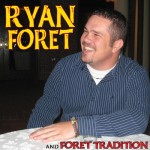When I was coming of age along the Northeast shoreline during the 1970s, my favorite local band was Southside Johnny and the Asbury Jukes, a horn-laden R&B outfit spawned by the fertile music scene in Asbury Park, New Jersey. The Jukes’ first album, I Don’t Want to Go Home remains a blue-eyed-soul masterpiece to this day. What I loved about the Jukes was not only that they had amazing chops and killer arrangements, but they also had profound musical knowledge and impeccable musical taste.
Holding it all together were the lead vocals of “Southside” Johnny Lyon. To give his buddies’ first album a boost, Bruce Springsteen wrote the liner notes, describing Southside as “the only white kid on the Jersey shore that you could stand to hear sing straight R&B five sets a night.” I was reminded of that quote the minute I heard the opening lines of the first track on Let the Groove Move Ya, “If It’s Really Got to Be This Way,” a hit for Memphis soul singer Arthur Alexander. Not only had Ryan Foret and Foret Tradition built an instantly absorbing arrangement of the tune that mirrored and transcended the original, Ryan Foret’s gruffly worn, deep Southern soul vocals left behind any comparisons to the original, letting you know he’d made the song his own. Listening to the rest of the album, I was convinced I’d unexpectedly run into a South Louisiana combination of the Asbury Jukes, country/soul icon Delbert McClinton, and a latter-day incarnation of Fats Domino vocalizing in a lower, grittier register.
I had to ask: who were these guys and where’d they come from? Imagine my surprise, learning “these guys” were based on the Westbank in Westwego and Marrero, and that leader, lead singer, arranger, and producer Ryan Foret was only 30 years old, with a half-dozen releases already on his résumé. I’d like to tell you that subsequent listening revealed the flaws and limitations of Let the Groove Move Ya, but I can’t. Instead I’m forced to admit that as familiar as you might be with the entire history of well-established genres like roadside R&B, local swamp pop, and blue-eyed soul (with some jump blues and country stylings thrown in for good measure), this tour-de-force sleeper of the year will surprise and delight you. Sandwiched between stunningly executed covers of “If It’s Really Got to Be This Way” and the Otis Redding/Wilson Pickett, Memphis-soul classic “You Left the Water Running,” you’ll find track after track of masterful musicianship, finely wrought arrangements, moving and total believable vocal nuance, and thoughtful, intelligent song selection focused almost exclusively on local originals and obscure national hits.
Foret has an amazing ear for sturdy song construction and compelling story lines, from better-known songs like the staring-at-a-half-empty-bottle country blues of singer-songwriter Jerry Reed’s “Misery Loves Company,” to the locally written, up-tempo title track and the down-the-highway anthem “Louisiana Bound.” I’ve become especially fond of “Ain’t No Trick,” a hard-driving, break-up blues with an easy-rollin’ beat backing up the story of a determined-but-unsure narrator who’s learned the hard-luck lesson that “there ain’t no trick to make love come to you / but it takes magic to make it stay.”
Once word about Let the Groove Move Ya starts to get out, there’s no way Ryan Foret’s going to remain a hard-working local act flying under the radar on the Westbank. Just one listen and you’ll be convinced.
Buy Ryan Foret & Foret Tradition’s Let the Groove Move Ya on iTunes
Listen to Ryan Foret & Foret Tradition’s Let the Groove Move Ya on Spotify





